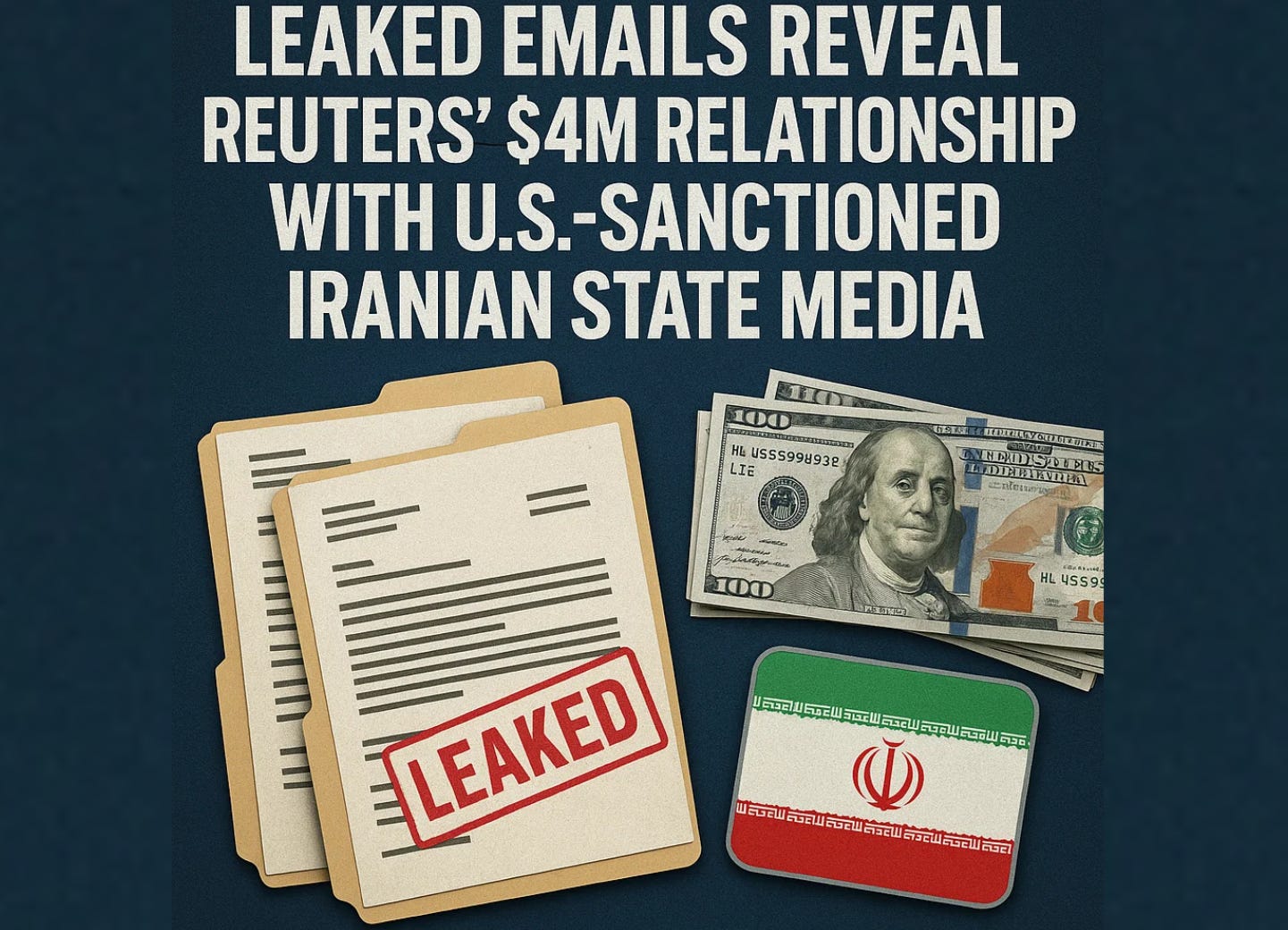Leaked Emails Reveal Reuters' $4M Relationship with U.S.-Sanctioned Iranian State Media
U.S. research institute NCRI reveals leaked emails detailing Reuters' $4M deal with Iran’s state-run, U.S.-sanctioned media, IRIB and Press TV
According to the Network Contagion Research Institute (NCRI), an American nonprofit organization that tracks misinformation and extremism using data-driven approaches, leaked internal emails from 2021 reveal a significant business relationship between Reuters and Iran's state media apparatus.
NCRI reports that Reuters supplied nearly $4 million worth of news services to Iran's state-controlled Islamic Republic of Iran Broadcasting (IRIB) and its English-language subsidiary, Press TV—both U.S.-sanctioned entities known for broadcasting regime propaganda. Press TV is focused on disseminating content that aligns with the Iranian government's narratives, while IRIB has been involved in airing forced confessions through torture and psychological abuse, earning the moniker "Torture TV.”
Reuters reportedly maintained direct communications with senior IRIB executives closely tied to Iran's Supreme Leader Ayatollah Ali Khamenei, even circumventing sanctions by agreeing to receive payments through third-party intermediaries while a Reuters Foundation employee was imprisoned in Iran.
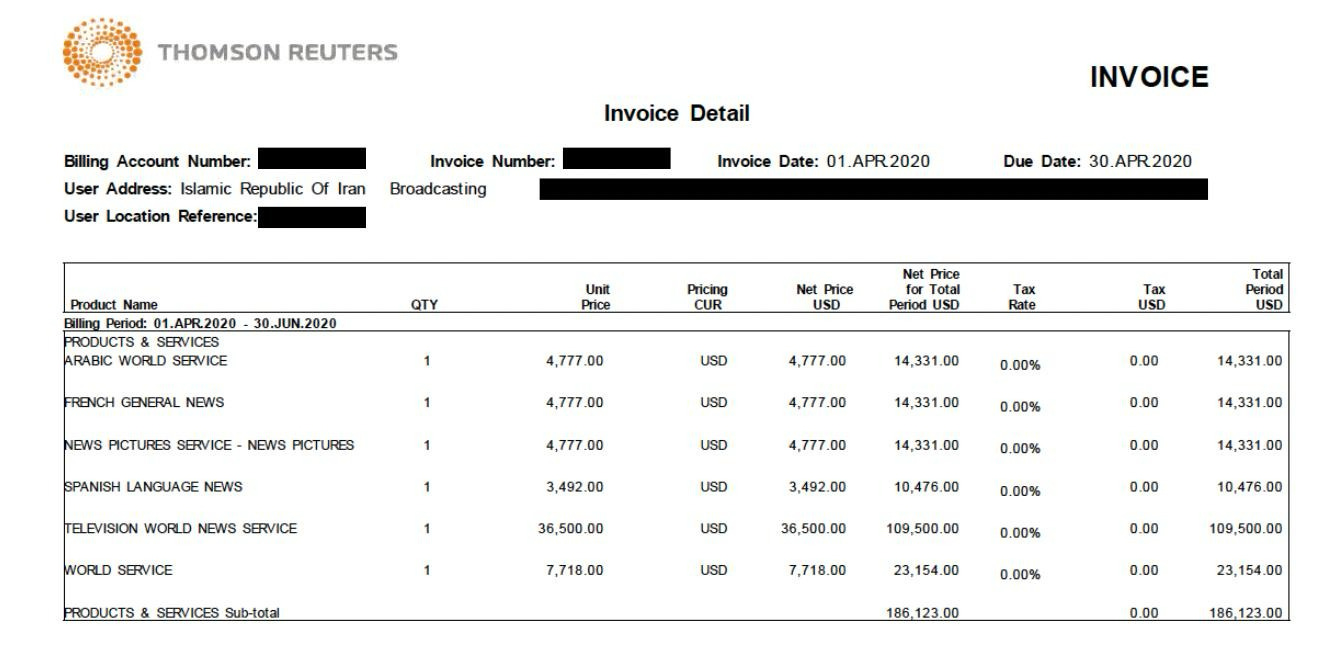
The Financial Relationship Unveiled
According to NCRI, a Reuters director sought roughly $3.88 million in overdue payments from IRIB for news services including text, video, and photos.

Leaked emails unearthed by NCRI show that when IRIB couldn't pay directly, likely due to sanctions, it introduced a third-party agent as an intermediary. The emails indicate that Reuters agreed to receive payment through this agent, with a Reuters director thanking IRIB for making the introduction and confirming an agreement with the intermediary.

NCRI findings indicate that Reuters made clear how dependent IRIB and Press TV were on its services. According to the leaked emails cited by NCRI, a Reuters director stated: "IRIB and Press TV have depended heavily on Reuters video and text services and I want to make sure that these services continue without any interruptions." The same director added: "I am under pressure from my management to start receiving payments as soon as possible."
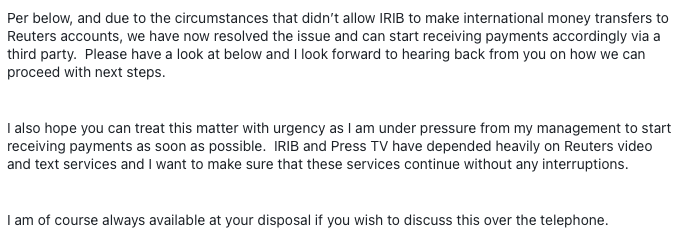
Key Figures in the Communications
NCRI maintains that Reuters communicated payment requests directly with Peyman Jebelli, a senior IRIB executive with close ties to Ayatollah Khamenei and a key figure in Iran's global information warfare strategy. Jebelli was appointed as IRIB director by Iran's Supreme Leader in September 2021 and was later sanctioned by the U.S. Treasury Department in November 2022 for his role in facilitating the Iranian regime's violent suppression of dissent.
NCRI findings reveal that Reuters emails were also addressed to Ahmad Noroozi, who serves as head of IRIB World Service and CEO of Press TV. Noroozi was subsequently sanctioned by the U.S., EU, and Canada for his role in broadcasting coerced confessions and collaborating with Iranian intelligence services.
Reuters' Role in IRIB Coverage of Regional Conflicts
The relationship appeared particularly significant during major regional conflicts. NCRI’s findings highlight that Reuters noted its services were especially important to IRIB during "the recent Palestine/Israel crisis"—likely referring to the 2021 Israel-Hamas war. A leaked internal email from Reuters to IRIB references the outlet's use of Reuters content, including "tens of thousands of unique stories/video (live and footage) on rotation hundreds of thousands of times."
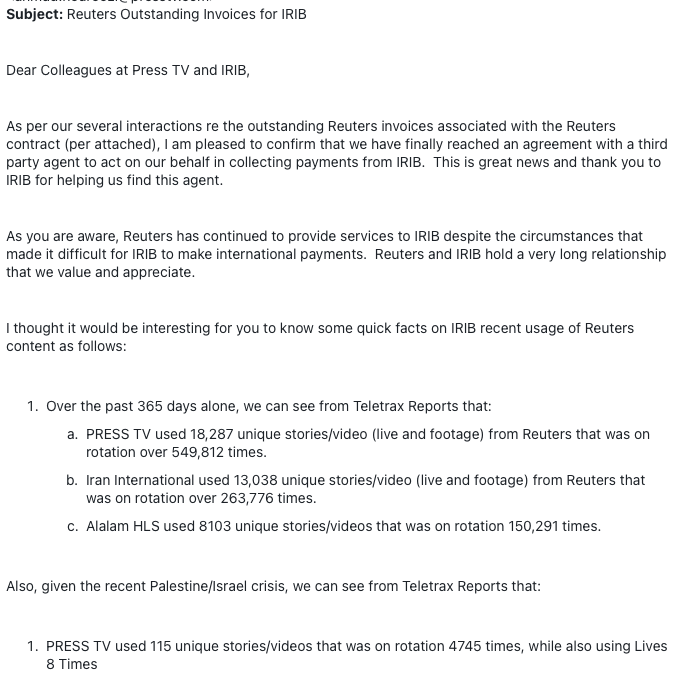
Corporate Disclosure Issues
The NCRI investigation found that Reuters did not disclose to investors that its client was IRIB. NCRI researchers discovered that Reuters referred only to "one broadcasting entity in Iran" and cited a U.S. sanctions exemption for "informational materials" like newswires.
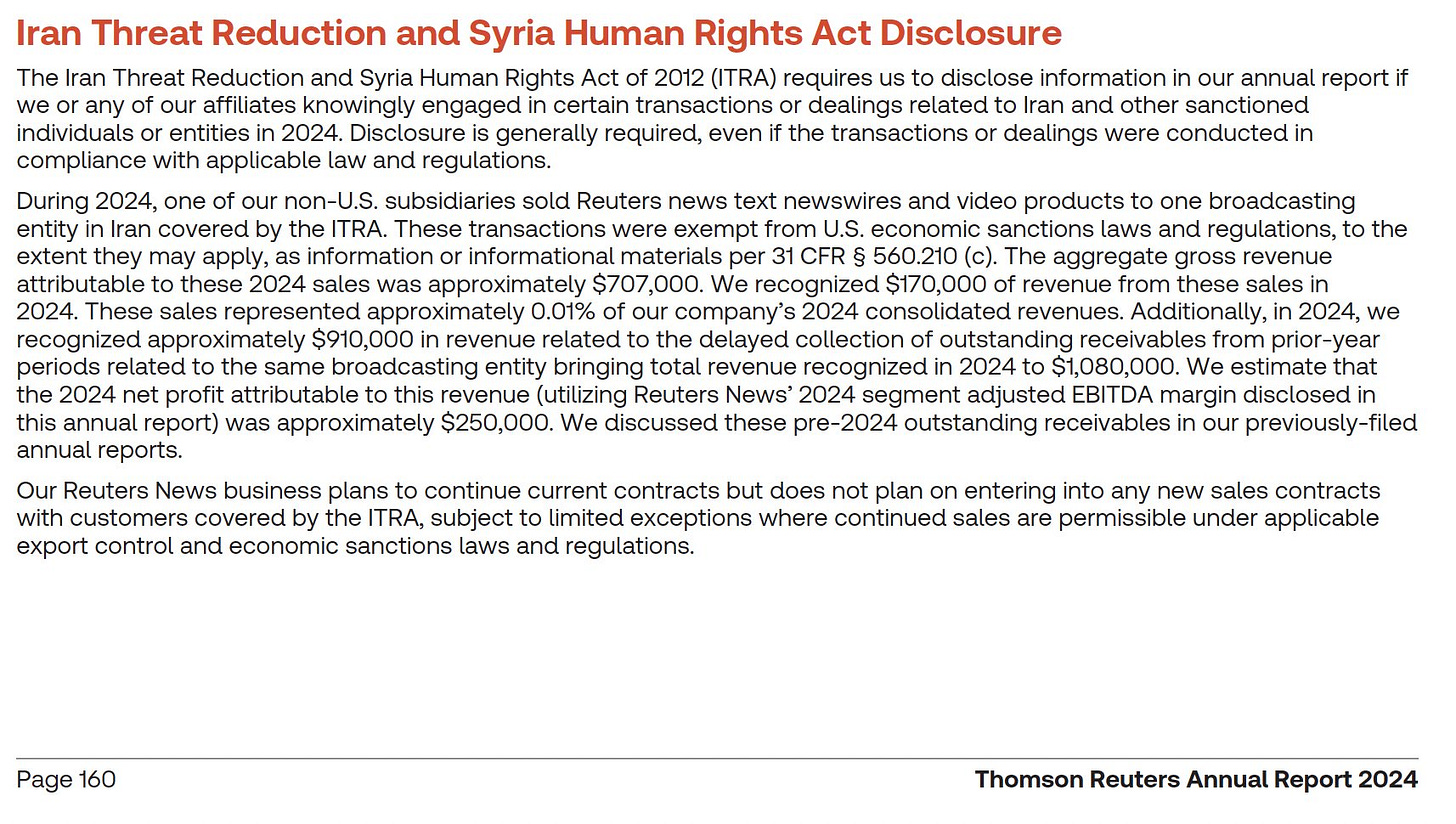
IRIB: Iran's Propaganda Machine
Jewish Onliner reported that from July 17–21, 2025, IRIB organized a four-day event titled "Condemnation of Terrorism Against Media," bringing together international journalists and social media influencers, including controversial American activist Calla Walsh. The event included visits to an IRGC-established military exhibition and meetings with Iran's National Security and Foreign Policy Committee. This raised serious concerns about Western influencers potentially amplifying Iranian state narratives and violating U.S. sanctions protocols.
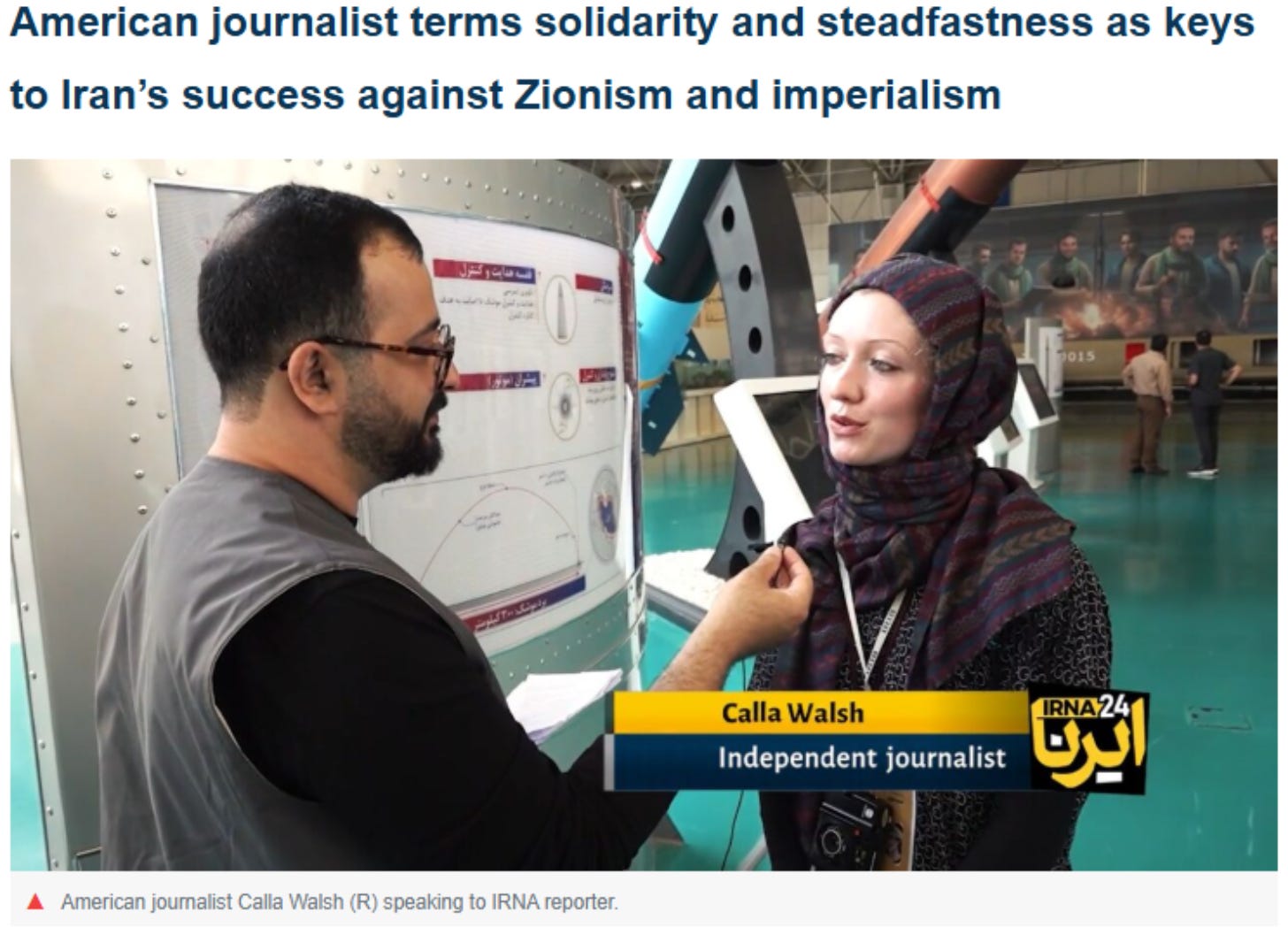
Israeli forces targeted IRIB headquarters on June 16, 2025, as part of Operation Rising Lion, with Israeli Defense Minister Israel Katz stating that "The Iranian propaganda and incitement mouthpiece is on its way to disappear." The strike underscored IRIB's role as a key pillar of the regime's information warfare capabilities.
The Nazanin Zaghari-Ratcliffe Connection
NCRI’s findings raise particular concerns about the timing of Reuters' business relationship. The investigation revealed that these services were provided while Nazanin Zaghari-Ratcliffe, a British citizen and Reuters Foundation employee, was imprisoned in Iran's Evin Prison. During her detention, Press TV—the very outlet Reuters was supplying—aired false propaganda about Zaghari-Ratcliffe to justify her detention.
Source of the Leaked Documents
NCRI notes that these emails and invoices are from the Press TV Files, much of which are in Persian and were released on Telegram in 2022 by a self-described hacktivist group called Black Reward. The files were later archived by DDoSecrets (Distributed Denial of Secrets), and their existence was previously reported by Washington Post.
The Black Reward group has been active in targeting Iranian regime infrastructure, having previously hacked Iran's nuclear establishment and other government entities. The Press TV Files contain over 31,600 emails and attachments, which DDoSecrets has made available to journalists and researchers due to their sensitive nature.
Questions and Implications
The NCRI investigation raises several critical questions about Reuters' relationship with Iranian state media. Why did Reuters continue a business relationship with a broadcaster that targeted a Reuters Foundation employee? Has this relationship impacted how Reuters covers Iran, IRIB, Press TV, or Middle East issues more broadly? How significant was Reuters' role in supporting IRIB's propaganda operations? Is this relationship still ongoing?
The revelations come at a time when Western governments are increasingly scrutinizing business relationships with sanctioned Iranian entities, and when IRIB continues to serve as a primary tool for regime propaganda and the suppression of dissent within Iran.



